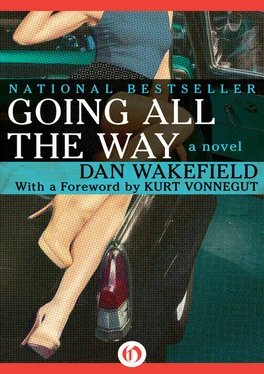“Give it a chance, boy,” Matthews said. “Give it a fair chance.”
Luke stood up and plucked a book from the coffee table beside him and handed it to Sonny.
“I don’t even ask you read it all,” he said, “although many have found some interest in its pages. I merely ask that you note from the jacket what it is really about, rather than make your own prejudgments.”
The cover had the title and showed a man in a prison outfit kneeling in the prayer position, with the sky opening up to throw down the heavenly spotlight on him.
On the back was a picture of Luke at his craggiest, and an explanatory blurb:
Luke Matthews is the pseudonym of a hardened convict whose evil deeds as a young man struck terror into the hearts of many citizens and communities in the area where he was reared, somewhere west of the Mississippi River. At nineteen he was sentenced to forty years in federal prison on a variety of counts, and was judged untreatable by prison psychologists, a hard-core case of criminal personality. However, at the age of twenty-four, while working on the rockpile, he experienced a personal religious revelation that sent him for days into a coma during which the only words he muttered, over and over, were “Luke—3:24.” Witnesses claim that Matthews had never read a Bible in his life and was totally unfamiliar with the scriptures. Yet, when he recovered and asked for a New Testament, and saw the message, he knew that God had spoken to him, and he gained an inner calm and strength that changed his entire personality. He became assistant to the prison truck gardener and developed a new breed of hardy carrot that can be grown even in the soil of the desert. At age thirty-nine, after twenty years in prison, he was released on good conduct. Despite his flair for horticulture, Matthews felt that he was called to a vocation of spiritual guidance, not limited to any denomination. He founded and organized the movement known as “Retreats Away in the Woods” (popularly known as “RAW”), which has become a source of inspiration and healing for growing thousands. On leaving prison, Matthews shed his old name with his old life, and has since walked in the steps of his Master, under the new name by which he has counseled and inspired so many—Luke Matthews. This book is the story of his life and quest.
Sonny took a couple of swigs from his beer. “I read what it was about,” he said.
“So you see, son, I am not exactly naïve about the ways of the world.”
“I guess not,” Sonny said.
“So then, perhaps I can be of some service to you. As a friend. A man who has experienced much and found the Light after years of darkness.”
Sonny took a deep breath. “Mr. Matthews,” he said, trying to keep his voice steady, “I’m afraid there’s been a misunderstanding.”
“What’s that?”
“My mother.”
“Your mother understands that you are troubled, and she wishes to help you.”
“My mother does not understand that I am sick of hearing about God. I don’t believe in Him. I don’t even like Him.”
“Well.” Luke chuckled. “You can’t dislike something—or someone—who doesn’t exist. Now can you?”
Sonny closed his eyes. “Mr. Matthews, I have to work things out for myself.”
“Every man does, son. Every man does. But a man can be helped by his friends. Conversely, he can be led into harmful pathways by his friends, if he does not choose them carefully. Sometimes the most magnetic people, people of great personal charm and influence, do not use that gift for good works. They may not be evil in themselves, yet they may walk in evil ways and lead others with them on the downward path.”
Sonny began to see Mr. Matthews’ mission more clearly. He had evidently been commissioned by Mrs. Burns to “save” her precious little boy from the evil influence of Gunner Casselman. Sonny tried to keep calm. He counted to twenty-five.
“Sir, I’m afraid my mother doesn’t understand about my friends either,” Sonny said with slow, precise emphasis. “I am afraid she will let me have to choose my own friends. I’m—I am no longer a little boy.”
He hadn’t quite been able to bring himself to say, “I am a man,” for fear it might not sound convincing.
“You are at a turning point,” Luke Matthews said gently.
“Well then, I’ll make the goddam turn myself!” Sonny shouted.
“I know how you feel, son.”
“You do? That’s fine! Because I have just one favor to ask you.”
“Anything that’s in my power, son.”
Sonny stood up. “Leave me alone. Leave me the fuck alone.”
Matthews folded his big hands together, cracking the knuckles like a volley of shots. “I will respect your wishes,” he said. “However, if you change your mind, if you wish to discuss with me any matter at all, I will be at your service as long as I am here.”
“Here?” Sonny asked. “You mean here in town?”
Matthews cleared his throat. “To be more specific, here in this lovely home, where your mother has so generously extended me your family’s hospitality.”
Purple spots began to float before Sonny’s eyes like bright balloons. He turned without saying anything and went upstairs to his room. There was a battered little black valise with the initials “L.M.” printed in gold, lying at the foot of the bottom bunk bed. Fresh towels and a washcloth were laid out neatly beside it. The purple balloons drifted out of Sonny’s sight, and his whole mind focused on a single stark fact.
He was rooming with Luke Matthews.
Sonny marched out of the house without even saying a word to his new roomie. He walked down to 59th Street and headed west, toward College Avenue. There was a Standard station there, with a phone booth. He was so mad he didn’t even want to use the telephone at home. That probably didn’t make sense, but somehow it matched the way he felt. He didn’t want to have anything to do with the goddam place. They ought to hang a goddam cross on the door and turn it into a mission. That’s almost what it was anyway.
He walked with a very determined pace along 59th Street, noting to himself that he was obeying the traffic law that said, “Where there are no sidewalks, walk on the left-hand side of the street, facing traffic.” Back in grade school you had to memorize the traffic laws, and Sergeant Hackenthorpe of the city police force came around to talk to the kids in the auditorium and told them all the horrible stuff that happened to you if you didn’t obey the traffic laws. The main thing Sonny remembered about the talk was Sergeant Hackenthorpe telling in a very sad voice about a kid who ran out into the street after his ball without looking both ways, and was hit by a car and killed. The boys had to try like mad to keep from laughing, and Richard Armitage got to giggling so hard that some snot came out of his nose and then everybody on his row cracked up and the principal had to quiet them down. What broke the guys up was the part about the kid running into the street after “his ball,” which they took to mean his testicle. The boys were just learning the words that had sex meanings as well as clean meanings and they went into fits when anyone said those kind of words you could take in a dirty way. But maybe Sonny figured, the whole uproar over the “ball” part of the story was what made him remember it, and made him remember the traffic laws. A person’s mind was really weird. Sonny found himself picturing one of his balls dropping off and rolling into the street and him running after it and getting hit by a car. Jesus, he was really in a stew.
By the time he walked the mile or so to the Standard station he was soaked with sweat, and he could feel his heart thumping like crazy. Sometimes when he got mad he thought he might be having a heart attack. Maybe that’s how he would die—of having a heart attack. It might not be so bad. It would sure as hell be better than having one of your balls drop off and roll out into the street, and then having a car hit you when you ran out to retrieve your ball. Sonny stepped into the phone booth and reached in his pocket for a dime to make a call, and while he was fishing around he just sort of checked on his balls to make sure they were safe inside there. His balls seemed to be O.K., but he only had a quarter and a nickel and some pennies. He walked up to the station and went inside, where a couple of grease-smeared guys in coveralls were horsing around. He hated to just ask them for change, which he thought might piss them off since he wasn’t buying anything, so he put his quarter in the Coke machine and got a bottle of Coke and a dime and a nickel back. He gulped down about half of the Coke, which was warm and acidy tasting, and went back out to the phone booth. He called up Gunner, but his mother answered and said he wasn’t home. She sounded very snippy about it, and Sonny just thanked her and hung up. He still had two nickels left, and he put them in the phone and dialed Buddie Porter’s number.
Читать дальше












